
by Ria Olivier | Oct 15, 2024 | Announcement, APECSSA
 Invitation to the third lecture in our 2024 Lecture Series. In this session, we will explore the development and communication of your personal brand, highlighting its critical importance for postgraduate students entering the competitive job market (more details below). The lecture will take place via Zoom (please note that the session will be recorded) and anyone interested in attending should please register via the link below. Date: Thursday, 17 October 2024 Time: Starts at 15:00 (GMT+2) Title: Personal Branding & CV Fundamentals Speaker: Annabel Eggeling (Leading Trends in People Management – Wits Business School 2010) Zoom registration link: https://eu01web.zoom.us/webinar/register/WN_PzOKgJwLReWQJg7kYNRH0w
Invitation to the third lecture in our 2024 Lecture Series. In this session, we will explore the development and communication of your personal brand, highlighting its critical importance for postgraduate students entering the competitive job market (more details below). The lecture will take place via Zoom (please note that the session will be recorded) and anyone interested in attending should please register via the link below. Date: Thursday, 17 October 2024 Time: Starts at 15:00 (GMT+2) Title: Personal Branding & CV Fundamentals Speaker: Annabel Eggeling (Leading Trends in People Management – Wits Business School 2010) Zoom registration link: https://eu01web.zoom.us/webinar/register/WN_PzOKgJwLReWQJg7kYNRH0w
 Description: This presentation explores the development and communication of your personal brand, emphasizing its critical importance for postgraduate students entering the competitive job market. In an era where AI and matching algorithms now play a pivotal role in CV selection, it’s essential to master the art of crafting a CV that makes it to the “short-list”. We will discuss strategies for optimizing your CV to stand out in Applicant Tracking Systems (ATS), including best practices for format and content. This session will also serve as a foundation for preparing for interviews, ensuring you are well-equipped to showcase your skills and experience effectively.
Description: This presentation explores the development and communication of your personal brand, emphasizing its critical importance for postgraduate students entering the competitive job market. In an era where AI and matching algorithms now play a pivotal role in CV selection, it’s essential to master the art of crafting a CV that makes it to the “short-list”. We will discuss strategies for optimizing your CV to stand out in Applicant Tracking Systems (ATS), including best practices for format and content. This session will also serve as a foundation for preparing for interviews, ensuring you are well-equipped to showcase your skills and experience effectively.
Bio: Annabel, who recently retired after a distinguished 30-year career with Accenture, brings a wealth of experience from her roles in Human Resources and Talent Supply Chain. Her career spanned multiple locations, including Johannesburg, Qatar, and Cape Town, where she led recruitment teams and interviewed candidates ranging from recent postgraduates to Managing Directors. Now retired from the corporate world, Annabel shares her expertise through various forums like SEAmester and APECS. In addition to offering literacy support to young students and raising guide dogs, she engages in knitting, crocheting for charitable organizations, and enjoys a range of personal interests such as hiking, swimming, and crafting.
If you have any questions or need further information, visit our website or contact apecssa@gmail.com.
We look forward to seeing you on Thursday!
Best regards,
APECS South Africa National Committee

by Ria Olivier | Mar 8, 2024 | Research, SANAP, SANAP Student, Science
 During the 6th SANAP symposium, time was allocated for the presentation of governance issues, and this was done on the first day during the opening ceremony. Dr Gilbert Siko , the Director of Marine & Polar Research at the Department of Science and Innovation gave the first presentation. His role within the Research Development and Support Programme it is to promote the development of research, the production of scientific knowledge, and human capital development in science areas in which South Africa enjoys a geographic advantage, that includes Antarctic and marine research. Dr Siko highlighted the strategic importance of the research conducted through the South African National Antarctic Programme.
During the 6th SANAP symposium, time was allocated for the presentation of governance issues, and this was done on the first day during the opening ceremony. Dr Gilbert Siko , the Director of Marine & Polar Research at the Department of Science and Innovation gave the first presentation. His role within the Research Development and Support Programme it is to promote the development of research, the production of scientific knowledge, and human capital development in science areas in which South Africa enjoys a geographic advantage, that includes Antarctic and marine research. Dr Siko highlighted the strategic importance of the research conducted through the South African National Antarctic Programme.
 Dr Siko was followed by Tracy Klarenbeek, Director of Knowledge Advancement and Support of the National Research Foundation (NRF). She highlighted that create innovative funding instruments such as SANAP serve to transform the scientific landscape and inspire a representative research community to aspire to global competitiveness. She shared the outcomes of the 2023 SANAP Call for Proposals for funding cycle 2024 – 2026 with the community. She also mentioned that mentorship initiatives for unsuccessful applicants would be implemented via SAPRI.(right)
Dr Siko was followed by Tracy Klarenbeek, Director of Knowledge Advancement and Support of the National Research Foundation (NRF). She highlighted that create innovative funding instruments such as SANAP serve to transform the scientific landscape and inspire a representative research community to aspire to global competitiveness. She shared the outcomes of the 2023 SANAP Call for Proposals for funding cycle 2024 – 2026 with the community. She also mentioned that mentorship initiatives for unsuccessful applicants would be implemented via SAPRI.(right)
Dr Siko was followed by Tracy Klarenbeek, Director of Knowledge Advancement and Support of the National Research Foundation (NRF). She highlighted that create innovative funding instruments such as SANAP serve to transform the scientific landscape and inspire a representative research community to aspire to global competitiveness. She shared the outcomes of the 2023 SANAP Call for Proposals for funding cycle 2024 – 2026 with the community. She also mentioned that mentorship initiatives for unsuccessful applicants would be implemented via SAPRI.

 Prof Bettine van Vuuren (right), Chair of the South African National Committee for SCAR gave feedback on the committee meeting. She also highlighted the function and activities of SCAR and the importance to be informed of these activities, and to be aware of scholarship opportunities. She encouraged early career researchers to become involved in SCAR committees and action scholarships.
Prof Bettine van Vuuren (right), Chair of the South African National Committee for SCAR gave feedback on the committee meeting. She also highlighted the function and activities of SCAR and the importance to be informed of these activities, and to be aware of scholarship opportunities. She encouraged early career researchers to become involved in SCAR committees and action scholarships.
The highlight of the Symposium was the international Antarctic day celebrations where Tracy Klarenbeek (left)addressed all attendees during the closing ceremony with a heartfelt talk. All participants, old and new, were thanked for their participation in the Symposium and their dedication to the SANAP programme. Tracy Klarenbeek talk gave a personal perspective of administering the SANAP programme:
“by facilitating Antarctic and Southern Ocean research, and awarding student bursaries, it is evident that the work I do changes lives”.
The opportunity to access the Southern Ocean, Antarctica and the sub-Antarctic islands (Gough and the Prince Edward Islands) is limited to the lucky few, and the work of the National Research Foundation makes this a reality for researchers and students alike.
 A printed Map of Antarctica was signed by everyone on International Antarctica Day 1st December 2023 at Houw Hoek Hotel!
A printed Map of Antarctica was signed by everyone on International Antarctica Day 1st December 2023 at Houw Hoek Hotel!
Speakers photos: credit Anche Louw – SA Polar Research Infrastructure/Antarctic Legacy of SA

by Ria Olivier | Mar 4, 2024 | APECSSA, Fellowship, Research, SANAP, SANAP Student
 For the first time ever at a SANAP Symposium an Early Career Event was organised by APECS-South Africa. The event was an opportunity to encourage ECRs to become members and to socialise with current members, in fact it was the first time that the current committee had all managed to meet in person and not over zoom. (Above group photo of APECSSA committee members 2024 that were able to attend the Symposium)
For the first time ever at a SANAP Symposium an Early Career Event was organised by APECS-South Africa. The event was an opportunity to encourage ECRs to become members and to socialise with current members, in fact it was the first time that the current committee had all managed to meet in person and not over zoom. (Above group photo of APECSSA committee members 2024 that were able to attend the Symposium)
 APECS-South Africa also wanted to use this time to engage in a community survey with ECRs to discuss important topics around career development and community inclusion. This survey was being conducted anonymously in real time and so provided a safe space for ECRs to raise any concerns they felt within the SANAP community. Most importantly, APECS-South Africa was able to then relay the results of this survey to the PIs and senior leadership of the SANAP community. (Above words used by ECRs to describe their journey, skills they need and what is missing in the organisation)
APECS-South Africa also wanted to use this time to engage in a community survey with ECRs to discuss important topics around career development and community inclusion. This survey was being conducted anonymously in real time and so provided a safe space for ECRs to raise any concerns they felt within the SANAP community. Most importantly, APECS-South Africa was able to then relay the results of this survey to the PIs and senior leadership of the SANAP community. (Above words used by ECRs to describe their journey, skills they need and what is missing in the organisation)

 APECS-South Africa plans to continue running this survey going forward at future SANAP Symposiums so that ECRs feel like their voice is being heard and help the SANAP Community become better and more inclusive for everyone. During the workshop ECRs were able to respond to many questions (above ex). If you as an ECR has not yet responded click on the QR Code.
APECS-South Africa plans to continue running this survey going forward at future SANAP Symposiums so that ECRs feel like their voice is being heard and help the SANAP Community become better and more inclusive for everyone. During the workshop ECRs were able to respond to many questions (above ex). If you as an ECR has not yet responded click on the QR Code.
Meet APECSSA 2024 Committee
Full feedback presentation available
(Text, Slides and Group Photo by Tommy Ryan-Keogh.)

by Ria Olivier | Feb 27, 2024 | Research, SANAP, SANAP Student
 Another session within the Marine and Antarctic Research Strategy research theme : Ecosystems, biodiversity and biodiscovery was chaired by Donald Cowan of the University of Pretoria, he also chaired the session for Thulani Makhalanyane’s project research. Dr Dowan started of the first section with his own presentation followed by research within his project.
Another session within the Marine and Antarctic Research Strategy research theme : Ecosystems, biodiversity and biodiscovery was chaired by Donald Cowan of the University of Pretoria, he also chaired the session for Thulani Makhalanyane’s project research. Dr Dowan started of the first section with his own presentation followed by research within his project.
 Above (l-r): Pedro Lebre, Silindile Maphosa, Lefentse Mashamaite
Above (l-r): Pedro Lebre, Silindile Maphosa, Lefentse Mashamaite
- Don Cowan: Microbial ecology of Antarctic desert soils. (Abstract)
- Pedro Lebre: Biogeographic survey of soil microbial communities across Antarctica. (Abstract)
- Silindile Maphosa: Exploring the functional potential of microbial metagenome-assembled genomes (MAGs) from sub-Antarctic islands. (Abstract)
- Lefentse Mashamaite: Microbial diversity in Antarctic Dry Valley soils across an altitudinal gradient. (Abstract)
 Prof Makhalanyane project presentations. Above (l-r): Runesu Bakasa, Marike Hillocks, Riaan Pierneef, Mancha Mabaso, Choaro Dithugoe
Prof Makhalanyane project presentations. Above (l-r): Runesu Bakasa, Marike Hillocks, Riaan Pierneef, Mancha Mabaso, Choaro Dithugoe
 Poster Presentations. Above (l-r): Sade Magabotha, Christophe Lefebvre, Elizabe Malan, Benjamin Abraham, Nelisiwe Hedebe, Michelle Bekker
Poster Presentations. Above (l-r): Sade Magabotha, Christophe Lefebvre, Elizabe Malan, Benjamin Abraham, Nelisiwe Hedebe, Michelle Bekker
- Sade Magabotha: A reproducible microbiome pipeline for the identification of horizontally acquired mobile genetic elements. (Abstract)
- Christophe Lefebvre: Using computational tools to shed light on microbes with capacity to degrade microplastics in the oceans. (Abstract)
- Elizabe Malan: Understanding the dynamics of microbial communities in the Congo River plume. (Abstract)
- Benjamin Abraham: Nutrient Co Limitation of Bacterial Communities within the Southern Ocean. (Abstract)
- Nelisiwe Hedebe: Charting the diversity of Giant viruses of Antarctic dry valley permafrost. (Abstract)
- Michelle Bekker: Phage diversity in the Southern Ocean. (Abstract)

 Although Prof Makhalanyane(left) could only attend the National Committee and not the presentations, his students from Pretoria University were able to visit his new workplace at Stellenbosch University. (Photo credit: Riaan Pienaar)
Although Prof Makhalanyane(left) could only attend the National Committee and not the presentations, his students from Pretoria University were able to visit his new workplace at Stellenbosch University. (Photo credit: Riaan Pienaar)

by Ria Olivier | Dec 12, 2023 | International Days, Research, SA Polar Research Infrastructure, SANAP, SANAP Student, SAPRI, SCAR, Science, SEAmester
 Over a period of 5 days 172 people participate in the 6th SANAP symposium. A lot has happened in the past 4 years since the last symposium in Hermanus in 2018 and feedback on research and other activities within SANAP featured on the program. The symposium was hosted by Stellenbosch University at Houw Hoek Hotel in the Grabouw valley where the participants built on a SANAP Research community for the future.
Over a period of 5 days 172 people participate in the 6th SANAP symposium. A lot has happened in the past 4 years since the last symposium in Hermanus in 2018 and feedback on research and other activities within SANAP featured on the program. The symposium was hosted by Stellenbosch University at Houw Hoek Hotel in the Grabouw valley where the participants built on a SANAP Research community for the future.
The Symposium kicked off with a hybrid meeting of the South African national committee for SCAR and the first evening a keynote lecture was presented by Prof Jukka Tukhuri (Aalto University, Finland) on the discovery of Shackleton’s Endurance on a voyage of the SA Agulhas II. During the symposium keynote lectures and plenary talks were given by Dr Peter Convey of British Antarctic Survey, Dr Sue Tonin of Mouse Free Marion and Prof Marcello Vichi on the Polar Lab part of the South African Polar Research Infrastructure (SAPRI).
 The purpose of the symposium was to facilitate the free exchange of scientific information within SANAP research. In the Marine and Antarctic Research strategy it states that: “The need for coordinated, extensive and targeted research in the marine and oceanic domain has been underlined. Coordination has become important as there has been a shift in marine science from resources and process studies that could be carried out by small groups or individuals to very large-scale regional climate and ecosystem studies, where the success, nooses and benefits lie in the coordination.” One of the strategies outlined is: “creation of a society informed on the value of marine and Antarctic research initiatives.”
The purpose of the symposium was to facilitate the free exchange of scientific information within SANAP research. In the Marine and Antarctic Research strategy it states that: “The need for coordinated, extensive and targeted research in the marine and oceanic domain has been underlined. Coordination has become important as there has been a shift in marine science from resources and process studies that could be carried out by small groups or individuals to very large-scale regional climate and ecosystem studies, where the success, nooses and benefits lie in the coordination.” One of the strategies outlined is: “creation of a society informed on the value of marine and Antarctic research initiatives.”
The following five thematic (vertical) areas were prioritised for research sessions and various principal investigators and researchers within SANAP chaired the sessions:
- Oceans and marine ecosystems under global change – Dr Rampai, Dr Fietz, Dr Thomalla, Dr Nicholson and Dr Lamont
- Earth systems observations – Prof Nel, Dr Lotz
- Ecosystems, biodiversity and biodiscovery – Prof Van Vuuren, Prof Cowan, Dr Greve, Prof Pistorius, Dr Wege,
- Innovation and development – Prof A Bekker
- Human Enterprise – Dr Lavery
Cross-cutting support interventions were discussed such as:
- Coordination and governance by Dr Gilbert Siko and Tracy Klarenbeek
- Human capital development and transformation chaired by Prof Ansorge
- Public awareness and engagement chaired by A Louw
- Research Infrastructure and platforms chaired by Dr T Morris
- Data management chaired by Dr Treasure
Feedback from SA National Committee for SCAR, APECSSA, SCALE expeditions and SEAmester were given and an evening session was held by the APECSSA committee where all the early career researchers that attended the symposium had great discussions. The newly established SAPRI was showcased to the SANAP community in cross discipline sessions on research infrastructure and platforms, data management and engagement, and a keynote lecture on the SAPRI Polar Lab that concluded all the research presentations

 It was the first time that so many South African polar researchers were together on the 1st December on International Antarctic Day and a special Antarctic Breakfast took place to commemorate this International Day. A map of Antarctica, was signed and a cake was provided to celebrate the occasion.
It was the first time that so many South African polar researchers were together on the 1st December on International Antarctic Day and a special Antarctic Breakfast took place to commemorate this International Day. A map of Antarctica, was signed and a cake was provided to celebrate the occasion.
 The organising committee would like to thank all participants and attendees for making the 6th SANAP symposium a success and achieving its aim in building a SANAP research Community for the future. We are looking forward to the next Symposium in Kruger National Park in 2025 that will be hosted by a consortium of University of Johannesburg, Fort Hare University and the University of the Free State.
The organising committee would like to thank all participants and attendees for making the 6th SANAP symposium a success and achieving its aim in building a SANAP research Community for the future. We are looking forward to the next Symposium in Kruger National Park in 2025 that will be hosted by a consortium of University of Johannesburg, Fort Hare University and the University of the Free State.
Comment by an ECR: “This was my very first SANAP symposium and it was absolutely incredible! Job well done to all those who assisted in organizing the event. Although it was a jam-packed week, the sessions were extremely interesting and well organized. The location was a perfect venue choice for this kind of event – especially for people to mingle, engage with one another and building strong relationships as well as for making connections for potential research collaborations. I am really impressed with the big focus that this symposium had on Early Career Researchers – I think it is a great way of getting the younger professionals more involved and to network! Congrats on pulling off a very successful SANAP Symposium!”
More will follow of the symposium and sessions that took place with a photos.
A huge thank you to the NRF for making the symposium possible and to all our suppliers and sponsors; Houw Hoek Hotel, Neelsie Travel Bureau, Adjuvo enterprises, Trilogy Audio Services, Crazylicous Cookies.
Featured Image: David Hedding
Image of signatures on Antarctica map : Anche Louw
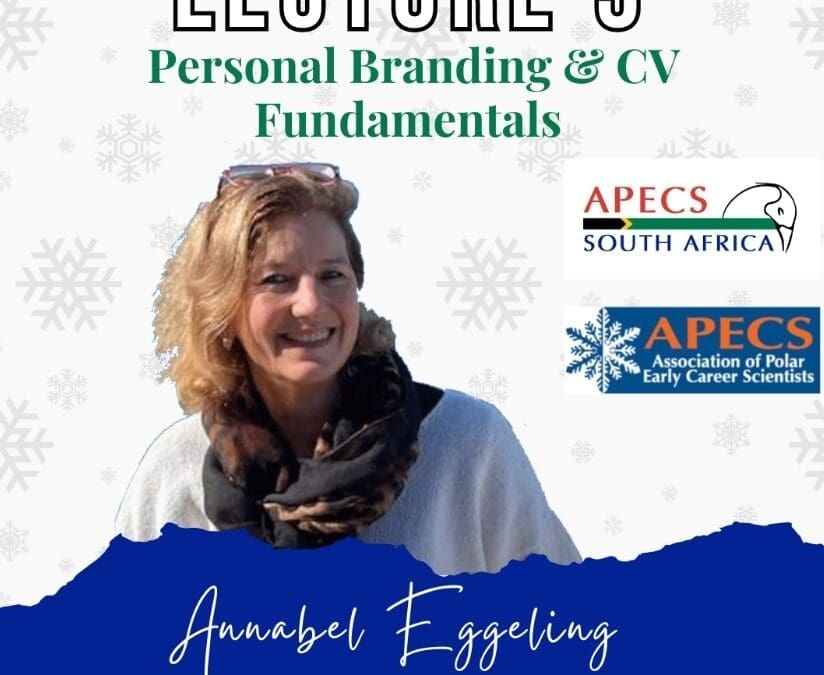
 Invitation to the third lecture in our 2024 Lecture Series. In this session, we will explore the development and communication of your personal brand, highlighting its critical importance for postgraduate students entering the competitive job market (more details below). The lecture will take place via Zoom (please note that the session will be recorded) and anyone interested in attending should please register via the link below. Date: Thursday, 17 October 2024 Time: Starts at 15:00 (GMT+2) Title: Personal Branding & CV Fundamentals Speaker: Annabel Eggeling (Leading Trends in People Management – Wits Business School 2010) Zoom registration link: https://eu01web.zoom.us/webinar/register/WN_PzOKgJwLReWQJg7kYNRH0w
Invitation to the third lecture in our 2024 Lecture Series. In this session, we will explore the development and communication of your personal brand, highlighting its critical importance for postgraduate students entering the competitive job market (more details below). The lecture will take place via Zoom (please note that the session will be recorded) and anyone interested in attending should please register via the link below. Date: Thursday, 17 October 2024 Time: Starts at 15:00 (GMT+2) Title: Personal Branding & CV Fundamentals Speaker: Annabel Eggeling (Leading Trends in People Management – Wits Business School 2010) Zoom registration link: https://eu01web.zoom.us/webinar/register/WN_PzOKgJwLReWQJg7kYNRH0w Description: This presentation explores the development and communication of your personal brand, emphasizing its critical importance for postgraduate students entering the competitive job market. In an era where AI and matching algorithms now play a pivotal role in CV selection, it’s essential to master the art of crafting a CV that makes it to the “short-list”. We will discuss strategies for optimizing your CV to stand out in Applicant Tracking Systems (ATS), including best practices for format and content. This session will also serve as a foundation for preparing for interviews, ensuring you are well-equipped to showcase your skills and experience effectively.
Description: This presentation explores the development and communication of your personal brand, emphasizing its critical importance for postgraduate students entering the competitive job market. In an era where AI and matching algorithms now play a pivotal role in CV selection, it’s essential to master the art of crafting a CV that makes it to the “short-list”. We will discuss strategies for optimizing your CV to stand out in Applicant Tracking Systems (ATS), including best practices for format and content. This session will also serve as a foundation for preparing for interviews, ensuring you are well-equipped to showcase your skills and experience effectively.
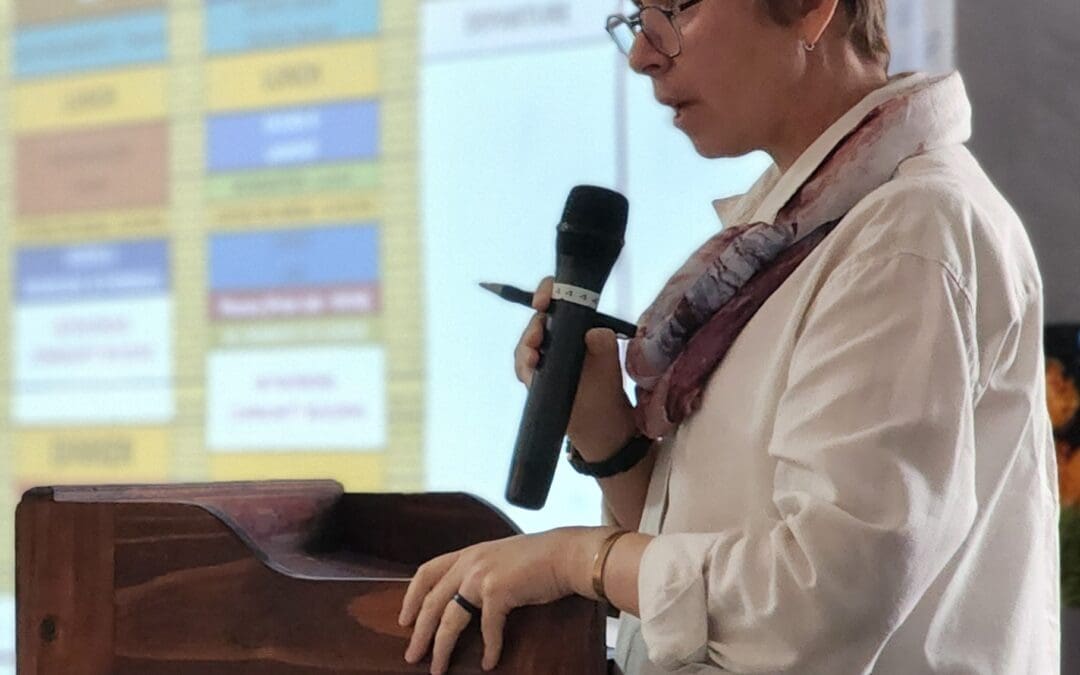
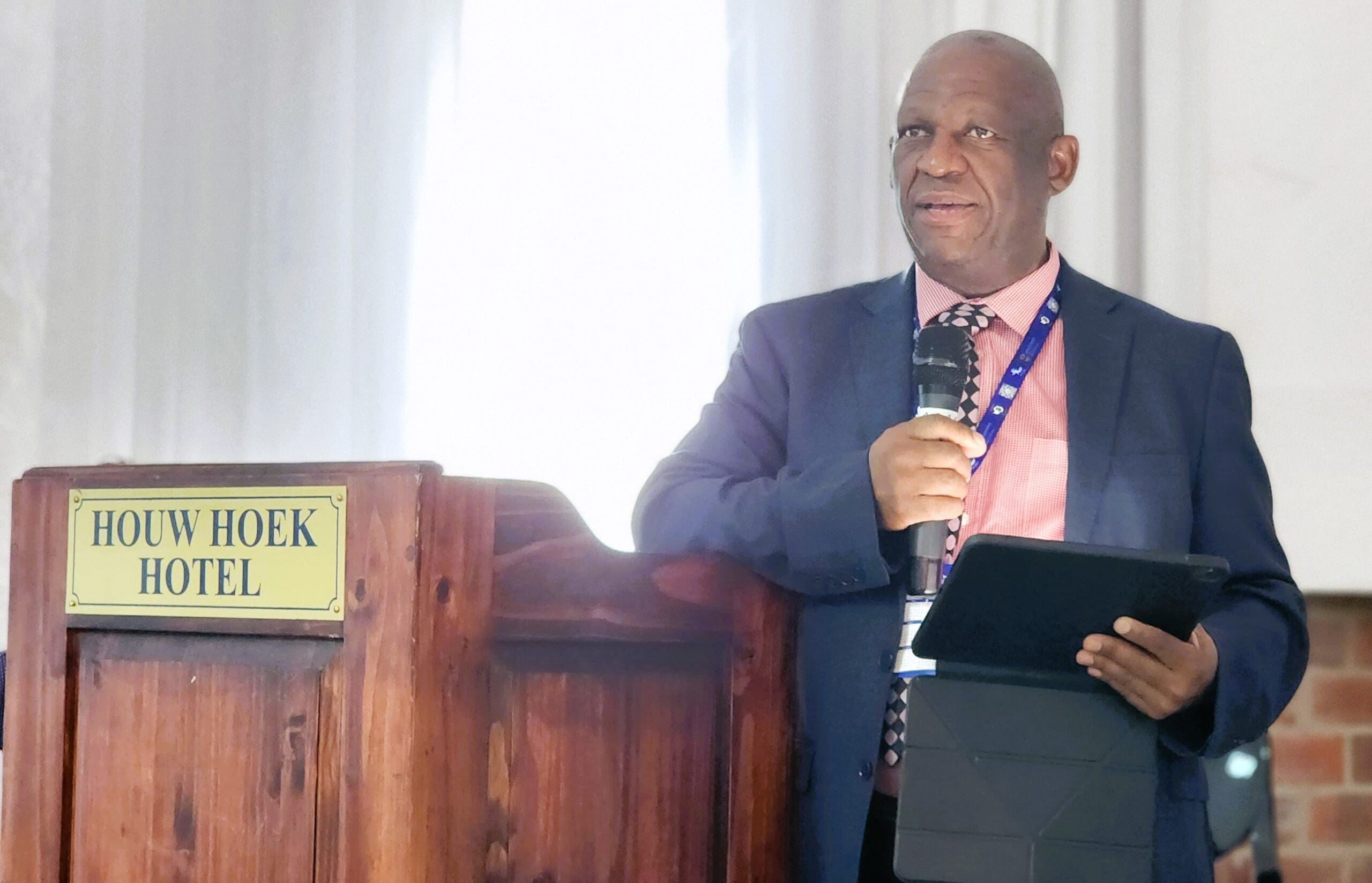 During the 6th SANAP symposium, time was allocated for the presentation of governance issues, and this was done on the first day during the opening ceremony. Dr Gilbert Siko , the Director of Marine & Polar Research at the Department of Science and Innovation gave the first presentation. His role within the Research Development and Support Programme it is to promote the development of research, the production of scientific knowledge, and human capital development in science areas in which South Africa enjoys a geographic advantage, that includes Antarctic and marine research. Dr Siko highlighted the strategic importance of the research conducted through the South African National Antarctic Programme.
During the 6th SANAP symposium, time was allocated for the presentation of governance issues, and this was done on the first day during the opening ceremony. Dr Gilbert Siko , the Director of Marine & Polar Research at the Department of Science and Innovation gave the first presentation. His role within the Research Development and Support Programme it is to promote the development of research, the production of scientific knowledge, and human capital development in science areas in which South Africa enjoys a geographic advantage, that includes Antarctic and marine research. Dr Siko highlighted the strategic importance of the research conducted through the South African National Antarctic Programme.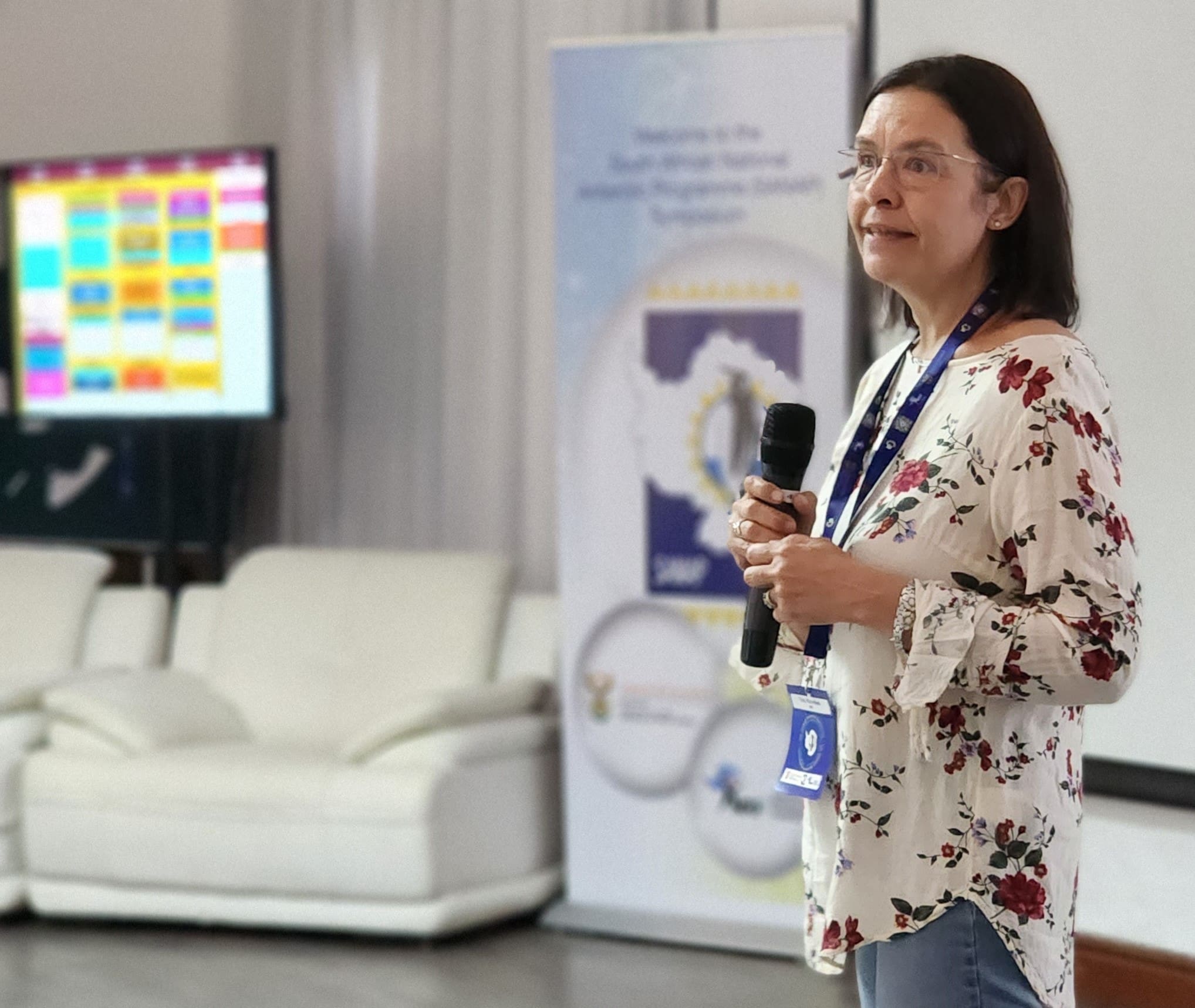 Dr Siko was followed by Tracy Klarenbeek, Director of Knowledge Advancement and Support of the National Research Foundation (NRF). She highlighted that create innovative funding instruments such as SANAP serve to transform the scientific landscape and inspire a representative research community to aspire to global competitiveness. She shared the outcomes of the 2023 SANAP Call for Proposals for funding cycle 2024 – 2026 with the community. She also mentioned that mentorship initiatives for unsuccessful applicants would be implemented via SAPRI.(right)
Dr Siko was followed by Tracy Klarenbeek, Director of Knowledge Advancement and Support of the National Research Foundation (NRF). She highlighted that create innovative funding instruments such as SANAP serve to transform the scientific landscape and inspire a representative research community to aspire to global competitiveness. She shared the outcomes of the 2023 SANAP Call for Proposals for funding cycle 2024 – 2026 with the community. She also mentioned that mentorship initiatives for unsuccessful applicants would be implemented via SAPRI.(right)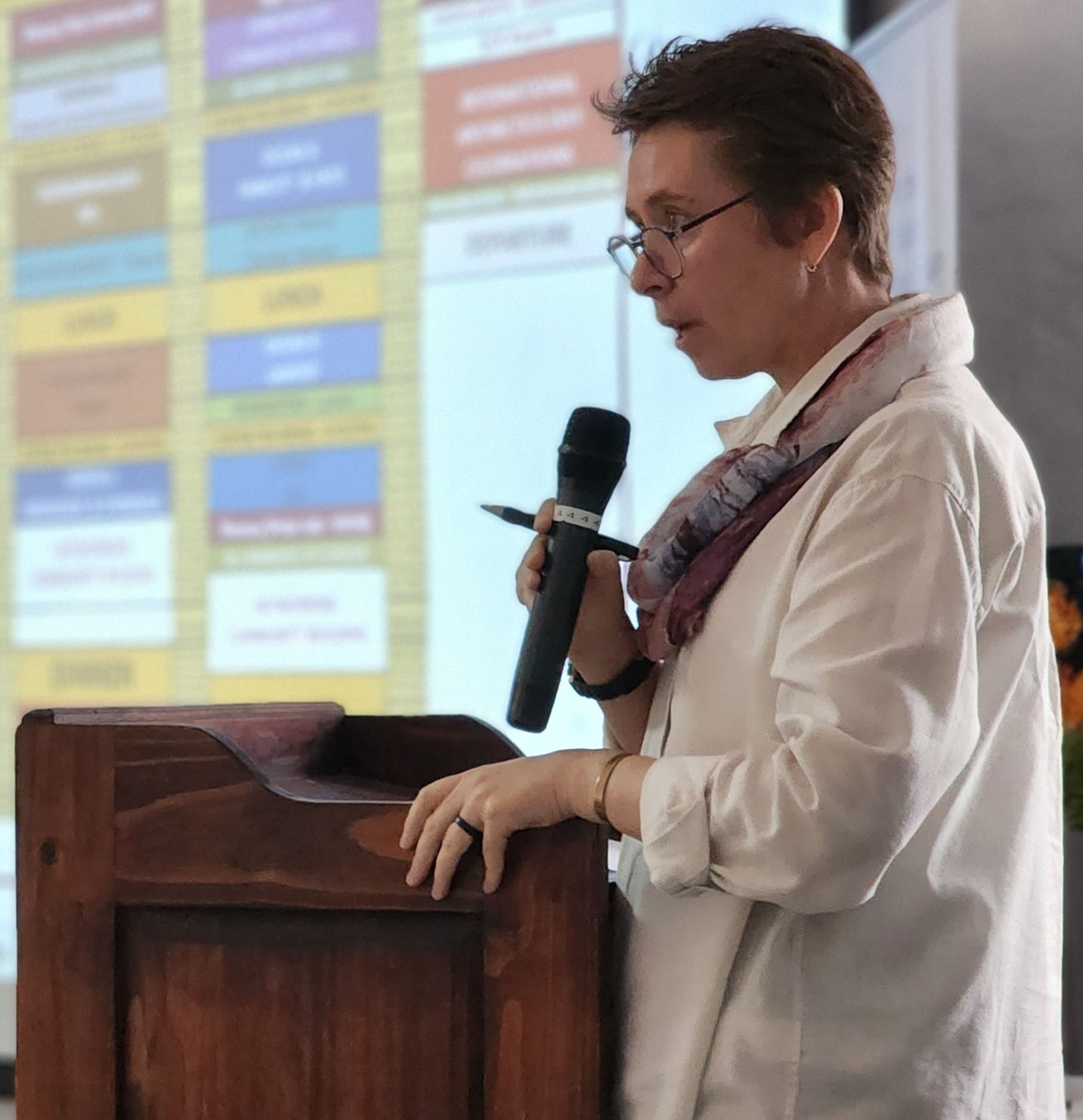
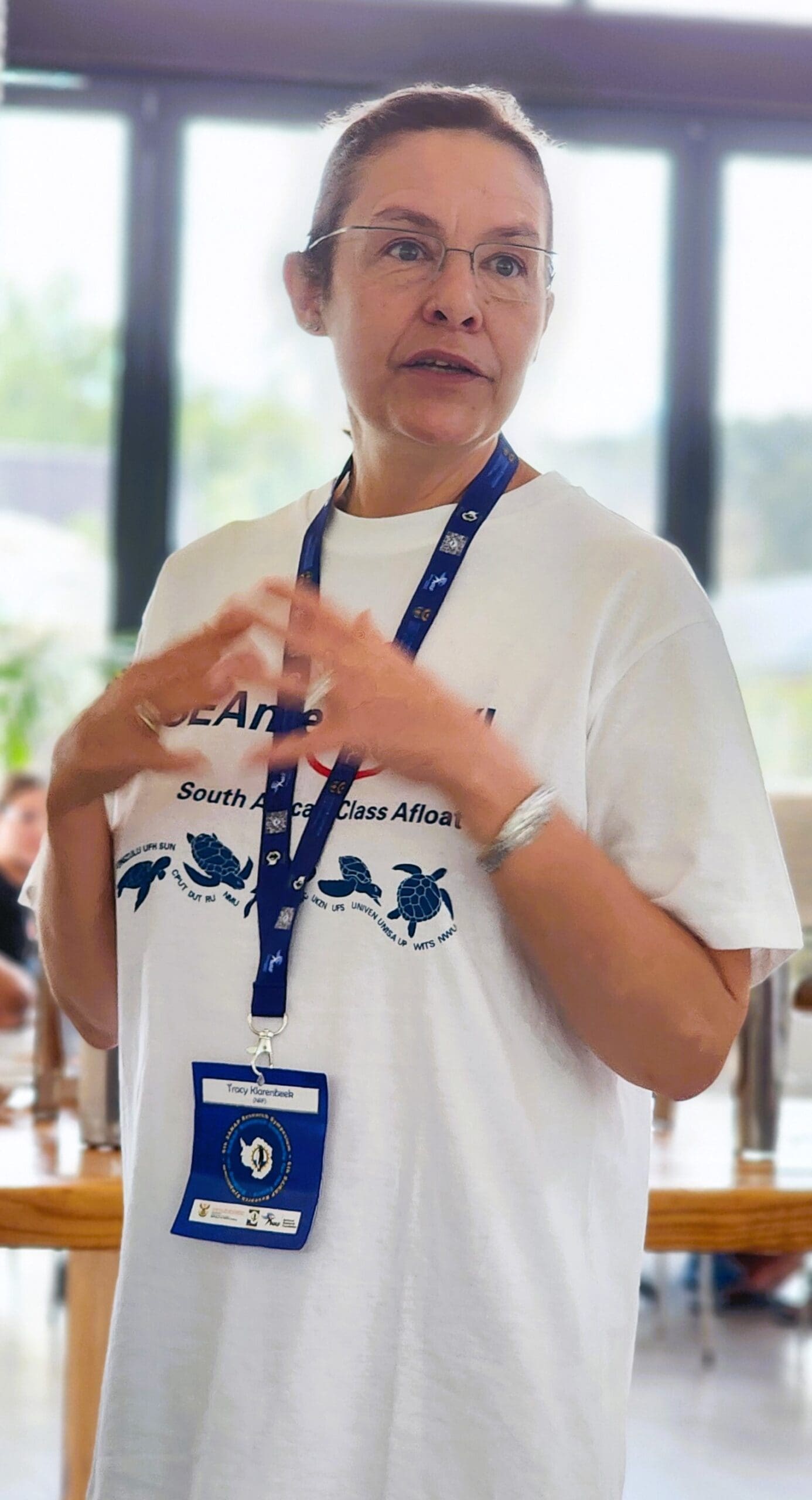 Prof Bettine van Vuuren (right), Chair of the
Prof Bettine van Vuuren (right), Chair of the  A printed Map of Antarctica was signed by everyone on International Antarctica Day 1st December 2023 at Houw Hoek Hotel!
A printed Map of Antarctica was signed by everyone on International Antarctica Day 1st December 2023 at Houw Hoek Hotel!
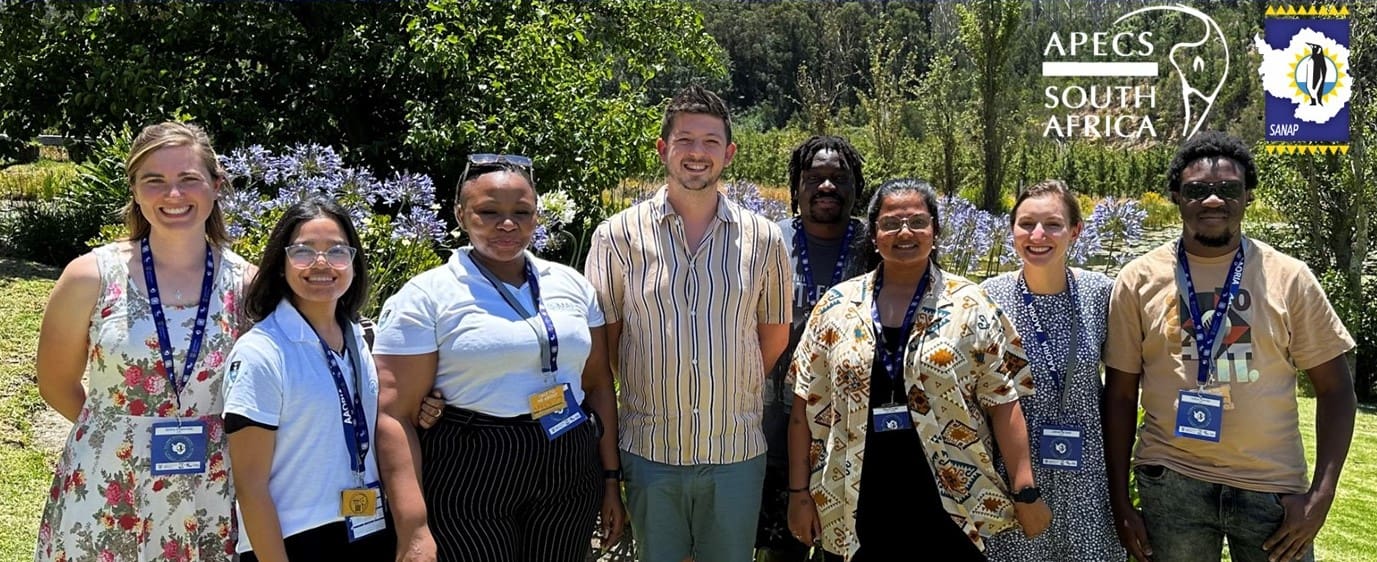 For the first time ever at a SANAP Symposium an Early Career Event was organised by APECS-South Africa. The event was an opportunity to encourage ECRs to become members and to socialise with current members, in fact it was the first time that the current committee had all managed to meet in person and not over zoom. (Above group photo of APECSSA committee members 2024 that were able to attend the Symposium)
For the first time ever at a SANAP Symposium an Early Career Event was organised by APECS-South Africa. The event was an opportunity to encourage ECRs to become members and to socialise with current members, in fact it was the first time that the current committee had all managed to meet in person and not over zoom. (Above group photo of APECSSA committee members 2024 that were able to attend the Symposium) APECS-South Africa also wanted to use this time to engage in a community survey with ECRs to discuss important topics around career development and community inclusion. This survey was being conducted anonymously in real time and so provided a safe space for ECRs to raise any concerns they felt within the SANAP community. Most importantly, APECS-South Africa was able to then relay the results of this survey to the PIs and senior leadership of the SANAP community. (Above words used by ECRs to describe their journey, skills they need and what is missing in the organisation)
APECS-South Africa also wanted to use this time to engage in a community survey with ECRs to discuss important topics around career development and community inclusion. This survey was being conducted anonymously in real time and so provided a safe space for ECRs to raise any concerns they felt within the SANAP community. Most importantly, APECS-South Africa was able to then relay the results of this survey to the PIs and senior leadership of the SANAP community. (Above words used by ECRs to describe their journey, skills they need and what is missing in the organisation)
 APECS-South Africa plans to continue running this survey going forward at future SANAP Symposiums so that ECRs feel like their voice is being heard and help the SANAP Community become better and more inclusive for everyone. During the workshop ECRs were able to respond to many questions (above ex). If you as an ECR has not yet responded click on the QR Code.
APECS-South Africa plans to continue running this survey going forward at future SANAP Symposiums so that ECRs feel like their voice is being heard and help the SANAP Community become better and more inclusive for everyone. During the workshop ECRs were able to respond to many questions (above ex). If you as an ECR has not yet responded click on the QR Code.
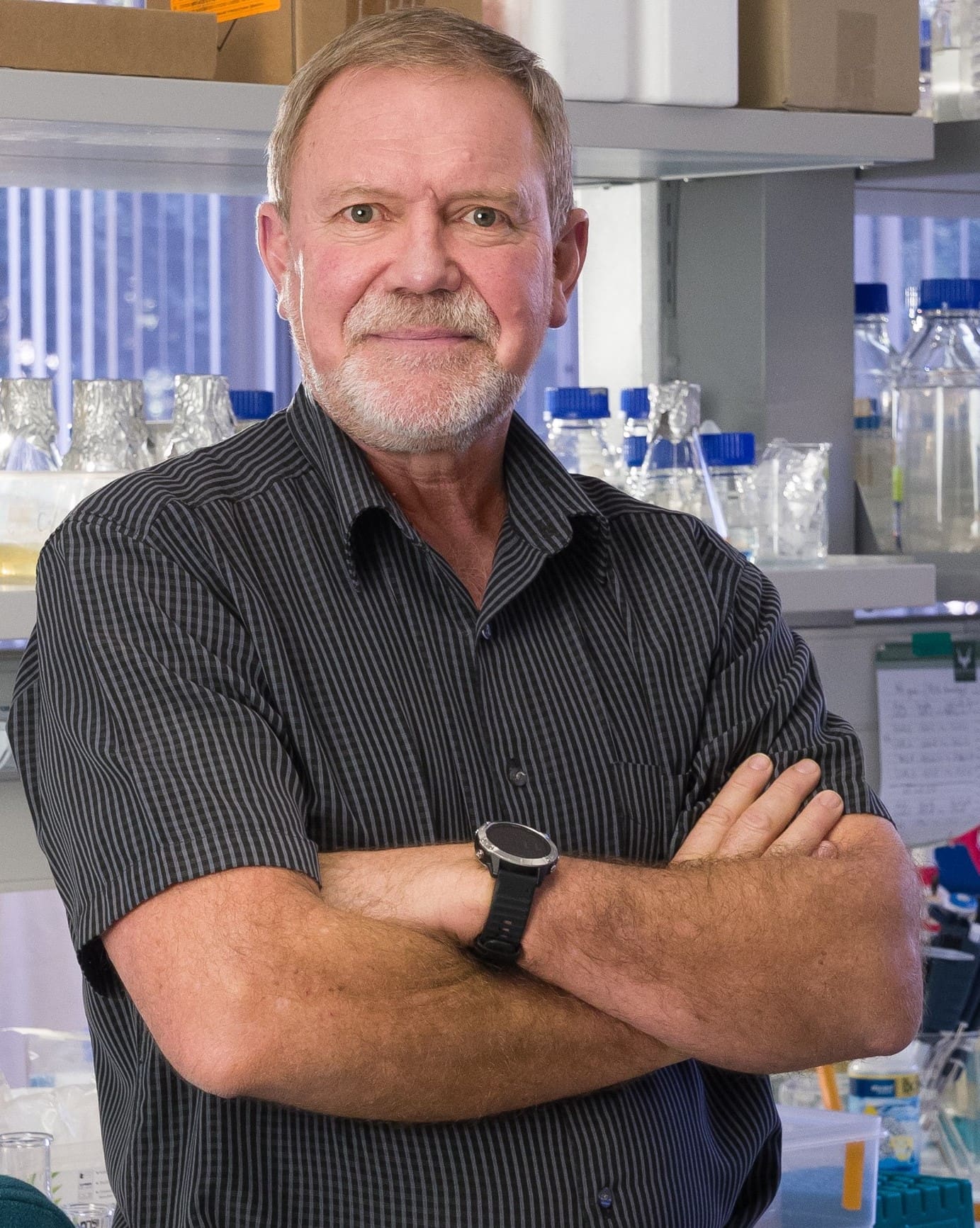 Another session within the
Another session within the 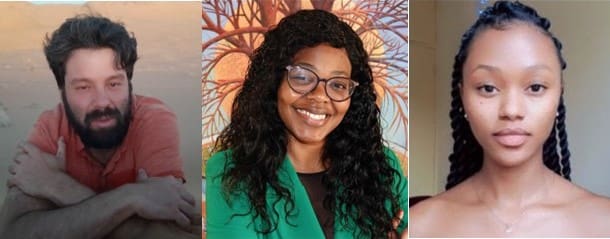 Above (l-r): Pedro Lebre, Silindile Maphosa, Lefentse Mashamaite
Above (l-r): Pedro Lebre, Silindile Maphosa, Lefentse Mashamaite Prof Makhalanyane project presentations. Above (l-r): Runesu Bakasa, Marike Hillocks, Riaan Pierneef, Mancha Mabaso, Choaro Dithugoe
Prof Makhalanyane project presentations. Above (l-r): Runesu Bakasa, Marike Hillocks, Riaan Pierneef, Mancha Mabaso, Choaro Dithugoe Above: (l-r)Nosipho Hlalukana, Nyasha Mafumo, Phillip Mawire, Mayinbogwe Buthelezi
Above: (l-r)Nosipho Hlalukana, Nyasha Mafumo, Phillip Mawire, Mayinbogwe Buthelezi Poster Presentations. Above (l-r): Sade Magabotha, Christophe Lefebvre, Elizabe Malan, Benjamin Abraham, Nelisiwe Hedebe, Michelle Bekker
Poster Presentations. Above (l-r): Sade Magabotha, Christophe Lefebvre, Elizabe Malan, Benjamin Abraham, Nelisiwe Hedebe, Michelle Bekker
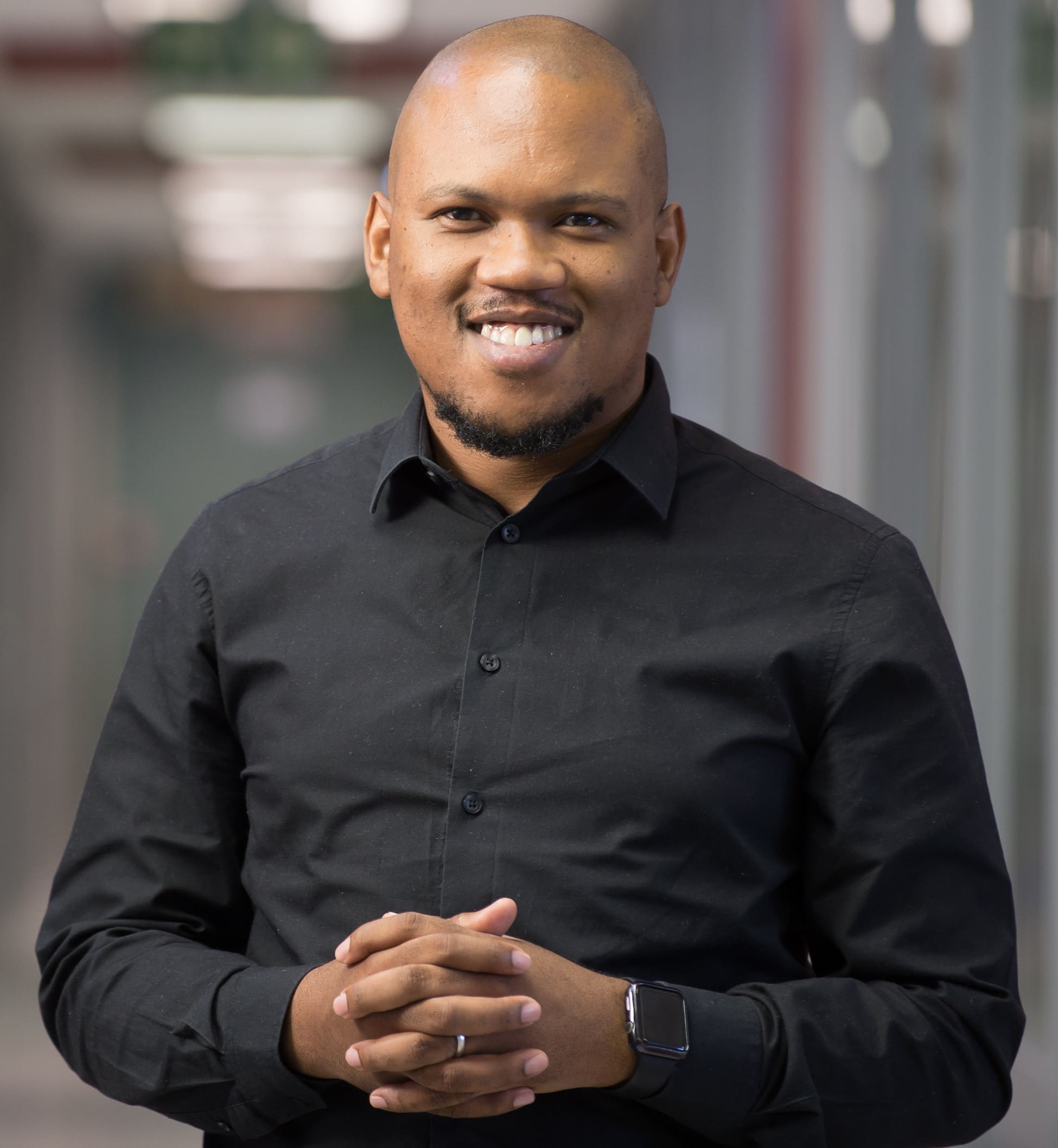 Although Prof Makhalanyane(left) could only attend the National Committee and not the presentations, his students from Pretoria University were able to visit his new workplace at Stellenbosch University. (Photo credit: Riaan Pienaar)
Although Prof Makhalanyane(left) could only attend the National Committee and not the presentations, his students from Pretoria University were able to visit his new workplace at Stellenbosch University. (Photo credit: Riaan Pienaar)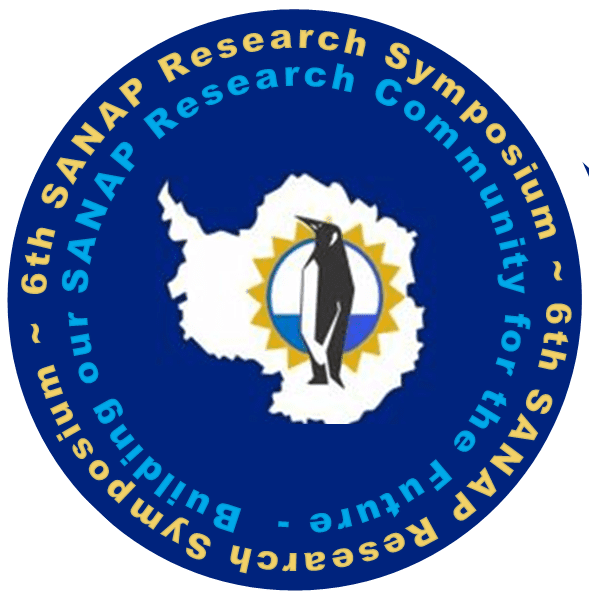
 Over a period of 5 days 172 people participate in the
Over a period of 5 days 172 people participate in the 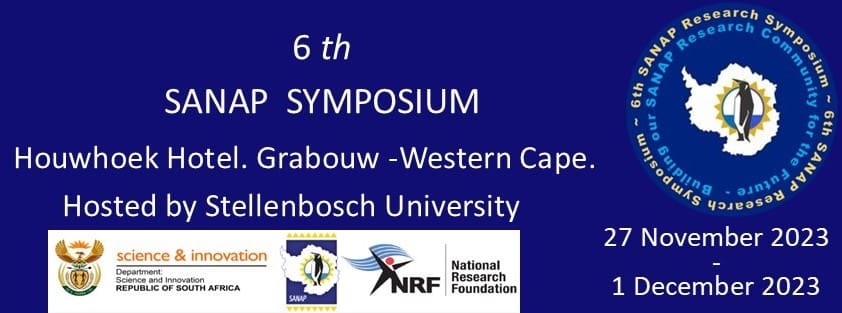 The purpose of the symposium was to facilitate the free exchange of scientific information within SANAP research. In the
The purpose of the symposium was to facilitate the free exchange of scientific information within SANAP research. In the 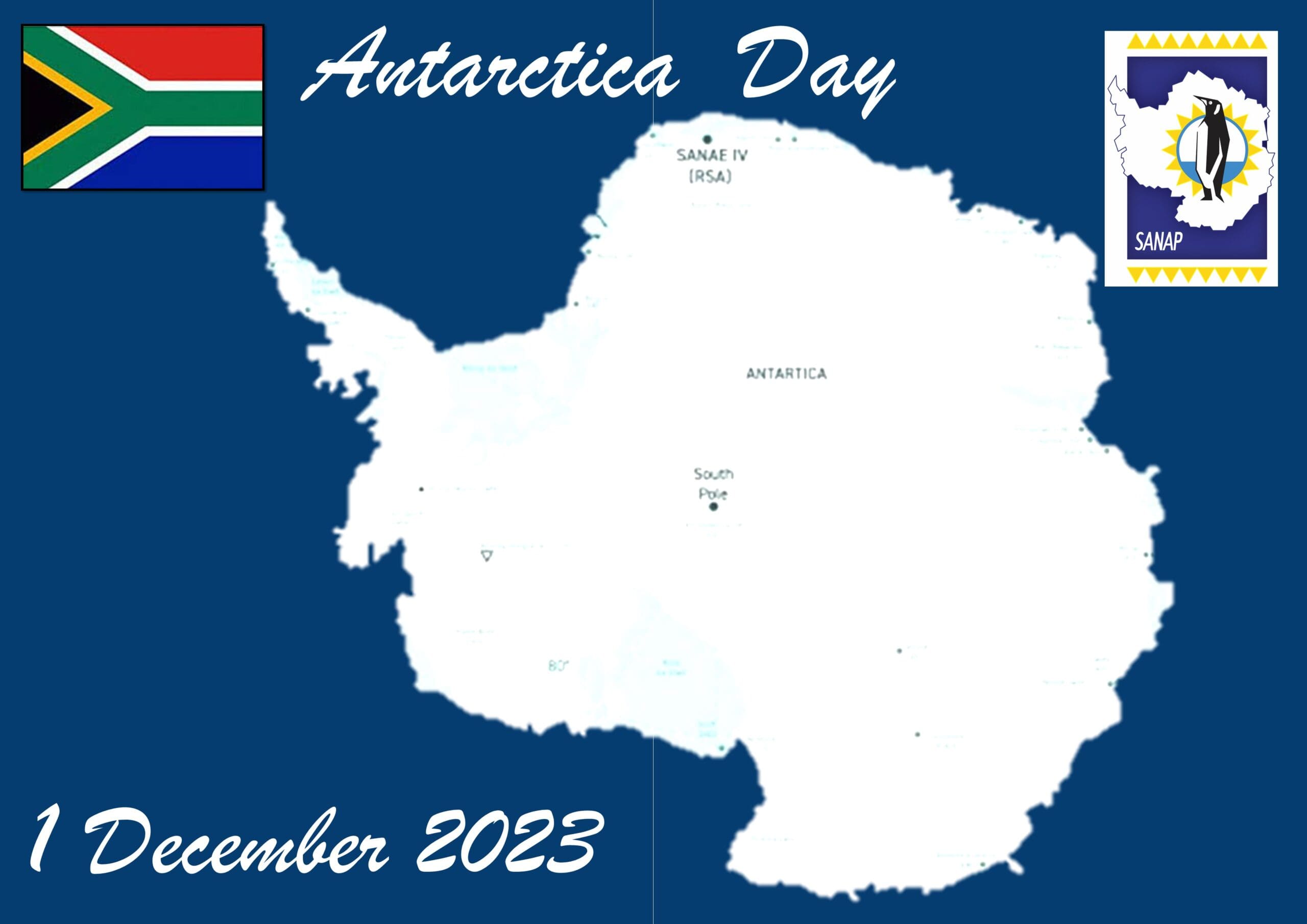 It was the first time that so many South African polar researchers were together on the 1st December on International Antarctic Day and a special Antarctic Breakfast took place to commemorate this International Day. A map of Antarctica, was signed and a cake was provided to celebrate the occasion.
It was the first time that so many South African polar researchers were together on the 1st December on International Antarctic Day and a special Antarctic Breakfast took place to commemorate this International Day. A map of Antarctica, was signed and a cake was provided to celebrate the occasion.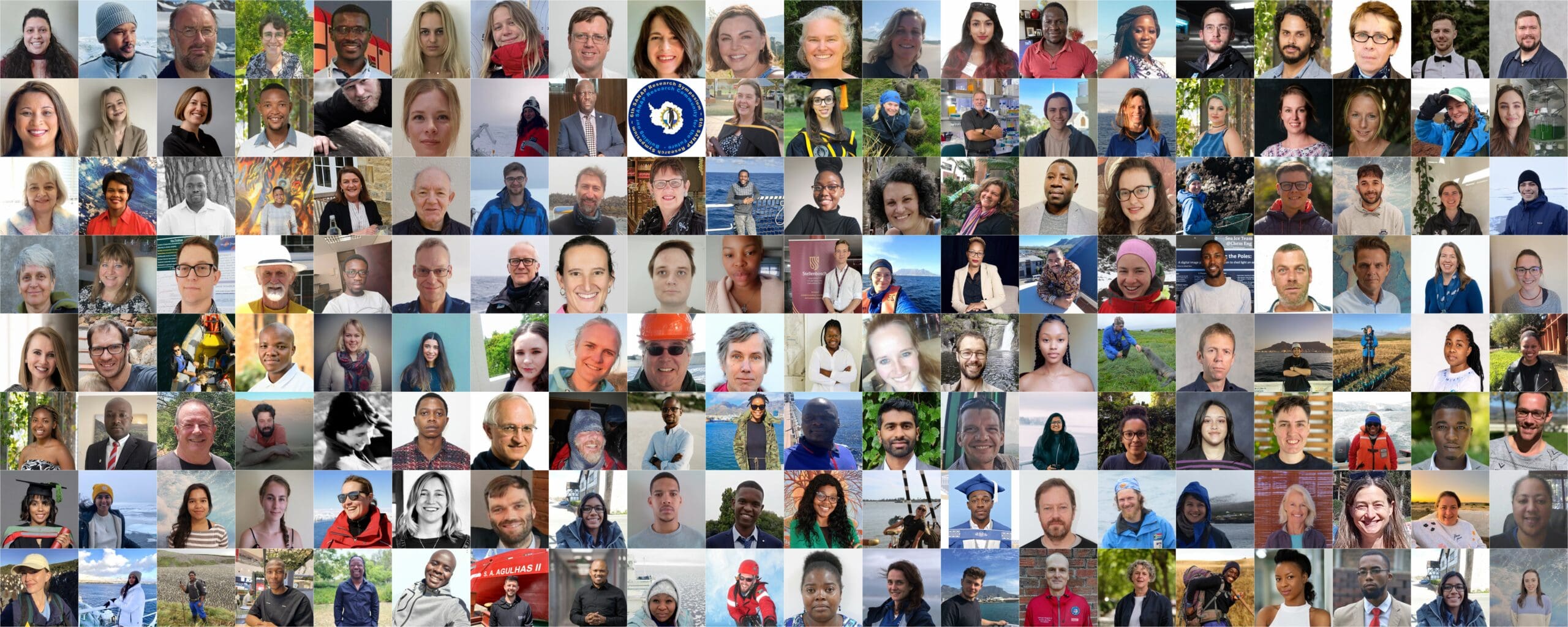 The organising committee would like to thank all participants and attendees for making the 6th SANAP symposium a success and achieving its aim in building a SANAP research Community for the future. We are looking forward to the next Symposium in Kruger National Park in 2025 that will be hosted by a consortium of University of Johannesburg, Fort Hare University and the University of the Free State.
The organising committee would like to thank all participants and attendees for making the 6th SANAP symposium a success and achieving its aim in building a SANAP research Community for the future. We are looking forward to the next Symposium in Kruger National Park in 2025 that will be hosted by a consortium of University of Johannesburg, Fort Hare University and the University of the Free State.




